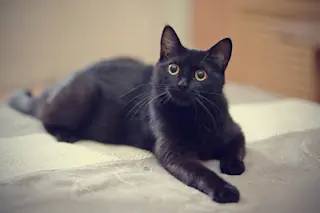Cats pop up in folklore and history all the way back to the Egyptians — who were notorious cat lovers and even cat worshippers. Cats were adored in ancient Rome, China, and the Middle East as well.
However, cats were not adored so much in the European middle ages — especially black cats. In 1233, Pope Gregory IX issued a papal bull — Vox in Rama — as an injunction against (as well as a screed about) satanic cults that he’d been informed were proliferating in parts of Germany.
The origins of black cat superstitions can be traced back to various historical, cultural, and religious beliefs. In the document’s colorful (and disgusting) descriptions of these heretical practices, Pope Gregory claimed that devil worshippers were consorting with their master in the form of a creature that was half man, half black cat.
Among other bizarre activities, participants in the ritual kissed ...















